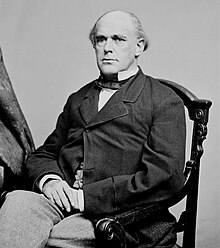Salmon P. Chase
American politician and lawyer (1808–1873)
(Redirected from Salmon Portland Chase)
Salmon Portland Chase (January 13, 1808 – May 7, 1873) was an American politician and jurist in the Civil War era who served as U.S. Senator from Ohio and Governor of Ohio; as Secretary of the Treasury under President Abraham Lincoln; and as Chief Justice of the United States.



Quotes
edit- For, what is slavery? It is the complete and absolute subjection of one person to the control and disposal of another person, by legalized force. We need not argue that no person can be, rightfully, compelled to submit to such control and disposal. All such subjection must originate in force; and, private force not being strong enough to accomplish the purpose, public force, in the form of law, must lend its aid. The Government comes to the help of the individual slaveholder, and punishes resistance to his will, and compels submission. THE GOVERNMENT, therefore, in the case of every individual slave, is THE REAL ENSLAVER, depriving each person enslaved of all liberty and all property, and all that makes life dear, without imputation of crime or any legal process whatsoever. This is precisely what the Government of the United States is forbidden to do by the Constitution. The Government of the United States, therefore, cannot create or continue the relation of master and slave. Nor can that relation be created or continued in any place, district, or territory, over which the jurisdiction of the National Government is exclusive; for slavery cannot subsist a moment after the support of the public force has been withdrawn.
- "The Address of the Southern and Western Liberty Convention", in Anti-slavery Addresses of 1844 and 1845 by Salmon Portland Chase and Charles Dexter Cleveland, ed. C. D. C. (London: Sampson Low, Son, and Martson, 1867), pp. 75–125.
- True democracy makes no enquiry about the color of skin, or the place of nativity, whereever it sees man, it recognizes a being endowed by his Creator with original inalienable rights.
- Address accepting a testimonial of gratitude from the colored people of Cincinnati for the advocacy in the case of Samuel Watson (February 12, 1845).
- No more slave States; no slave Territories.
- Platform of the Free Soil National Convention (1848).
- All that they seem to say is 'nigger, nigger, nigger'.
- Regarding the Democratic Party, speech at Sandusky (25 August 1859), Ohio
- The way to resumption is to resume.
- Letter to Horace Greeley (March 17, 1866)
- Congress was right in not limiting, by its reconstruction acts, the right of suffrage to whites; but wrong in the exclusion from suffrage of certain classes of citizens and all unable to take its prescribed retrospective oath, and wrong also in the establishment of despotic military governments for the States and in authorizing military commissions for the trial of civilians in time of peace. There should have been as little military government as possible; no military commissions; no classes excluded from suffrage; and no oath except one of faithful obedience and support to the Constitution and laws, and of sincere attachment to the constitutional Government of the United States.
- Letter to August Belmont (May 30, 1868), in J. W. Schuckers, The Life and Public Services of Salmon Portland Chase, (1874). p. 585.
- The Constitution, in all its provisions, looks to an indestructible Union composed of indestructible States.
- Texas v. White, 7 Wallace, 725 (1869)
- When Texas became one of the United States, she entered into an indissoluble relation. All the obligations of perpetual union, and all the guaranties of republican government in the Union, attached at once to the state. The Act which consummated her admission into the Union was something more than a compact; it was the incorporation of a new member into the political body. And it was final.
Quotes about Chase
edit- When Chase, Sumner, Stevens, and Wilson talk to the negro of the importance of having the franchise, and stop short of giving the franchise to woman, I proclaim them hypocrites—I proclaim them politicians. They speak so to the newly freed slave, because he has already the ballot in his hands, and they want him to vote for them. We have not that right, and hence they do not speak one word in favor of our attaining the elective franchise.
- Ernestine Rose, Address to the First Anniversary of the American Equal Rights Association (May 9, 1867)